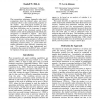Free Online Productivity Tools
i2Speak
i2Symbol
i2OCR
iTex2Img
iWeb2Print
iWeb2Shot
i2Type
iPdf2Split
iPdf2Merge
i2Bopomofo
i2Arabic
i2Style
i2Image
i2PDF
iLatex2Rtf
Sci2ools
AAAI
1994
1994
Situated Plan Attribution for Intelligent Tutoring
Plan recognition techniques frequently make rigid assumptions about the student's plans, and invest substantial effort to infer unobservable properties of the student. The pedagogical benefits of plan recognition analysis are not always obvious. We claim that these difficulties can be overcome if greater attention is paid to the situational context of the student's activity and the pedagogical tasks which plan recognition is intended to support. This paper describes an approach to plan recognition called situated plan attribution that takes these factors into account. It devotes varying amounts of effort to the interpretation process, focusing the greatest effort on interpreting impasse points, i.e., points where the student encounters some difficulty completing the task. This approach has been implemented and evaluated in the context of the REACT tutor, a trainer for Operators of deep space communications stations.
AAAI 1994 | Intelligent Agents | Plan Recognition | Plan Recognition Analysis | Plan Recognition Techniques |
| Added | 02 Nov 2010 |
| Updated | 02 Nov 2010 |
| Type | Conference |
| Year | 1994 |
| Where | AAAI |
| Authors | Randall W. Hill Jr., W. Lewis Johnson |
Comments (0)

